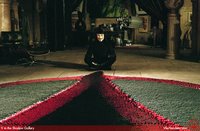
There is nothing subtle about the Wachowski brothers. In their latest creation, V for Vendetta based on the graphic novel by Alan Moore, Britain has become a police state and the USA is in the clutches of civil war. A lone individual garbed in black, armed with knives, and hidden behind a Guy Fawkes mask (a reference to the Gunpowder Plot of 1605) is the only one fighting against the tyrrany of the High Chancellor. When V rescues Evey from the secret police and she returns the favor, the fight is joined.
The success of this film is its ability to make people root for a character who is by all definitions, a terrorist. His intention is to overthrow the government through violent means. The inane argument that one man's terrorist is another man's freedom fighter actually takes on meaning. Is there ever a time when violent revolution can be a worthy cause? If so, what principles apply? The Wachowskis created a government that used fear to secure their own power and fortune in the most horrific way possible.
The characters who inhabit this malevolent government, the High Chancellor and the head of the Secret Police Creedy, are completely one diminsional. They are little more than caricatures of Hitler and his Nazi minions. There is certainly a less than hidden comparison to the American response to 9/11 here; few but the shrillest of the anti-Bush crowd would ever buy the analogy though.
Hugo Weaving, who plays V, is wasted in this role. His brilliant performance as Agent Smith in the Matrix trilogy is hardly replicated as one never sees his face. Natalie Portman handles nicely Evey's transition from sweet innocent to hardened freedom fighter. Stephen Rea, who plays Chief Inspector Finch, the conscience of the government, plays the dutiful English inspector, adding what little depth there is to the movie.
There is one brilliant bit of comedy, pure homage to Benny Hill, where the High Chancellor is lampooned by a closet resister played by Stephen Fry.
James McTeigue, the first time director who cut his teeth under the Wachowskis as first assistant director of the Matrix films, creates an overly clean film. The lack of grit or grime is due to the fact that majority of the film was shot on sound stages with blue screens. The Wachowskis' love of CGI leaves this film cold.
It could have been a better movie. If you spend the $10 to go see it, you will be entertained, but it will leave you with very little to chew on over coffee later.
Comments